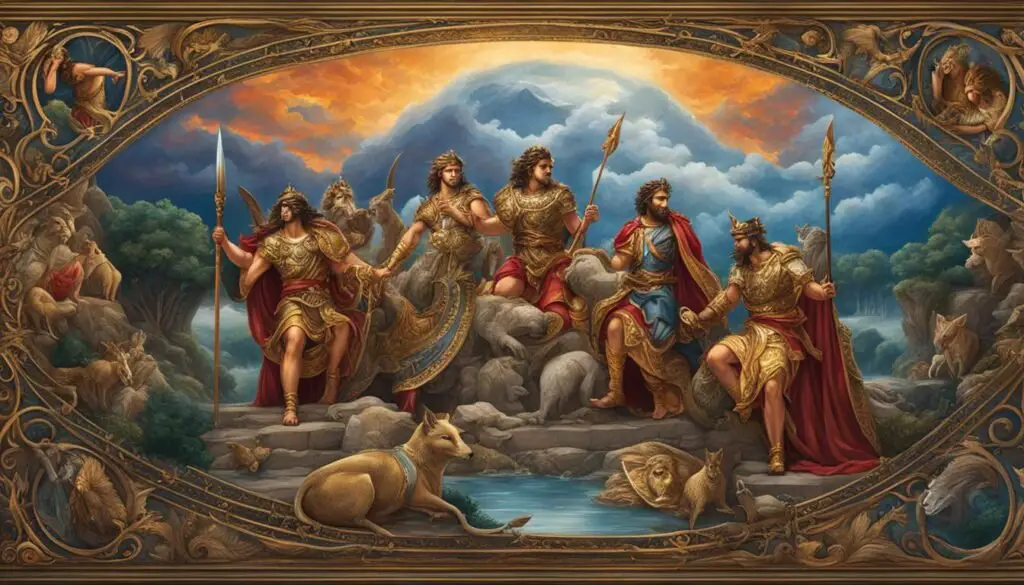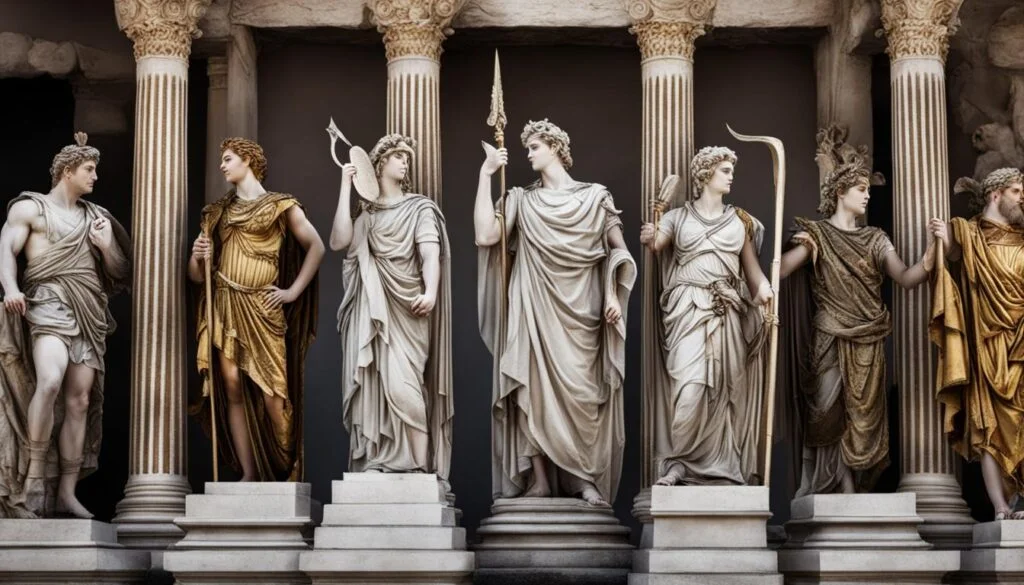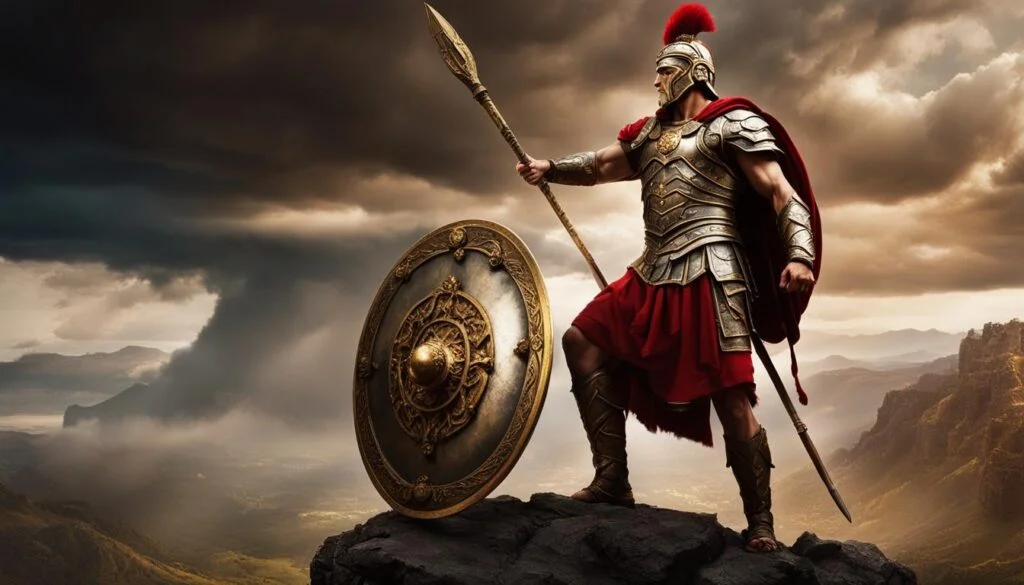Step into the fascinating world of Roman mythology, where gods and goddesses reigned supreme in the hearts and minds of ancient Romans. The Roman pantheon boasted 12 major gods, each with their own unique powers and significance. These deities played a crucial role in shaping the religious beliefs and cultural identity of the Roman people, leaving an indelible mark on history.
Let’s explore the enchanting realm of Roman gods and goddesses, their stories, and their influence on ancient Rome.
Key Takeaways:
- There were 12 major gods in Roman mythology who held significant roles in the Roman pantheon.
- These gods had their own names and distinct characteristics, separate from their Greek counterparts.
- The Roman gods included powerful deities such as Jupiter, Mars, Venus, and more.
- The belief in these gods was deeply ingrained in Roman society and had a profound impact on daily life.
- Roman mythology continues to captivate and inspire people worldwide, leaving a lasting legacy on Western civilization.
The 12 Roman Gods
In ancient Roman mythology, the pantheon of gods comprised 12 major deities who held great significance in the lives and beliefs of the Romans. Each god had their unique role and attributes, shaping various aspects of the Roman society and culture. Let’s explore the 12 Roman gods and discover their divine influence:
- Jupiter: Known as the king of the gods, Jupiter commanded thunder and lightning, symbolizing power and authority.
- Juno: As the queen of the gods, Juno was the goddess of women and fertility, embodying marriage and motherhood.
- Mars: Respected as the god of war, Mars represented strength, aggression, and the protection of Rome in times of conflict.
- Mercury: As the messenger of the gods, Mercury possessed great speed and agility, facilitating communication and trade.
- Neptune: Ruling over the sea, Neptune was associated with the vast depths and powerful currents of the ocean.
- Venus: Revered as the goddess of love and beauty, Venus embodied romance, desire, and physical attractiveness.
- Apollo: Known as the god of music and healing, Apollo inspired artistic expression and provided solace through medical remedies.
- Diana: As the goddess of hunting, Diana represented the wild, untamed nature and was associated with the moon.
- Minerva: Revered as the goddess of wisdom, Minerva symbolized intellect, strategy, and creative endeavors.
- Ceres: As the goddess of agriculture, Ceres governed the fertility of the earth, ensuring bountiful harvests.
- Vulcan: Regarded as the god of blacksmiths and volcanoes, Vulcan possessed exceptional craftsmanship and controlled the fiery depths of volcanoes.
- Vesta: Hailed as the goddess of hearth and home, Vesta safeguarded the sacred fire that symbolized the heart of Roman households.
These 12 Roman gods were integral to the spiritual and cultural fabric of ancient Rome, shaping the beliefs, values, and rituals of the Romans.
Jupiter, King of the Gods
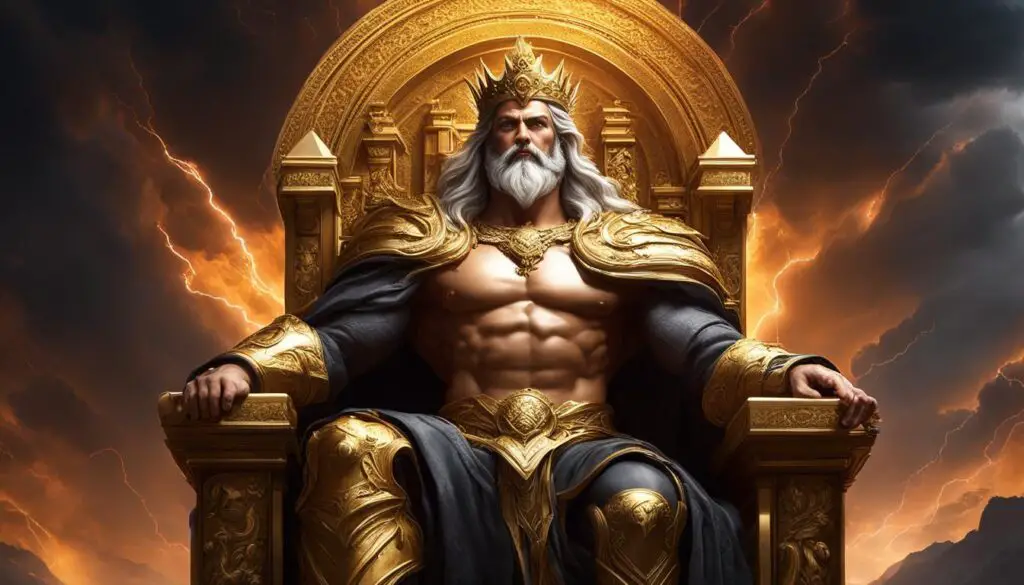
Welcome to the realm of Jupiter, the mighty king of the gods in Roman mythology. Known as Zeus in Greek mythology, Jupiter held supreme power and ruled over the heavens. His presence was often accompanied by the booming sound of thunder and the dazzling display of lightning.
Depicted with thunderbolts in his hands, Jupiter commanded the forces of nature, particularly thunder and lightning. He was revered by the ancient Romans as the most powerful deity, and his worship was central to their religious beliefs.
Jupiter was believed to grant victory in battles, protecting those who called upon him for aid. His influence extended beyond military conquests, encompassing various aspects of human life. As the supreme deity, he commanded respect and admiration from mortals.
Throughout the Roman Empire, magnificent temples were erected in Jupiter’s honor, where worshippers sought his blessings and favor. His role as the king of the gods and wielder of thunderbolts ensured his significance in Roman society.
Join us in the next section as we delve into the realm of Mars, the fierce god of war in Roman mythology.
Mars, God of War
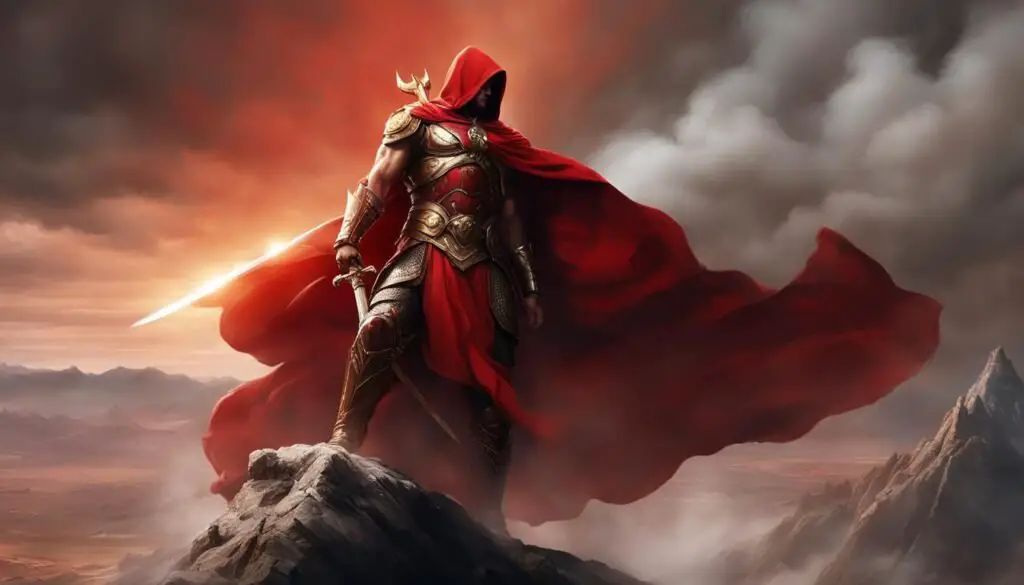
In Roman mythology, Mars was revered as the god of war, embodying the fierce and aggressive nature of conflict. He was considered the son of Jupiter and Juno, two prominent deities in the Roman pantheon. Mars played a crucial role in the lives of soldiers, as he was believed to grant them victory in battle.
Depicted with a sword and shield, Mars symbolized the violent and chaotic aspects of war. Warriors called upon his divine power, seeking his protection and guidance on the battlefield. Mars was a revered figure, and his worship was integral to the martial culture of ancient Rome.
Mars, also known as Ares in Greek mythology, held a prominent place in both Roman and Greek pantheons as the god of war.
Venus, Goddess of Love and Beauty
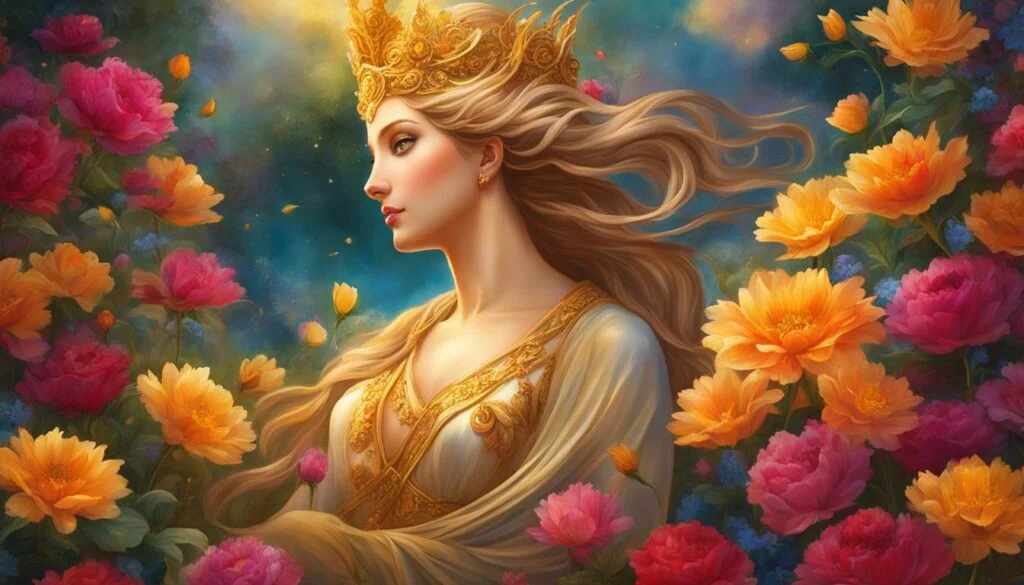
In Roman mythology, Venus, also known as Aphrodite in Greek mythology, is revered as the goddess of love and beauty. She embodies the ideals of romance, desire, and physical attractiveness. Venus is often depicted as a captivating and elegant deity, inspiring love and passion among both mortals and gods alike.
Worshipped for her ability to bring joy and happiness through love, Venus holds a special place in the hearts of the Romans. Her divine influence transcends mortal boundaries, stirring deep emotions and nurturing powerful connections. Just as Venus brings forth beauty and charm, her worshippers seek to embrace the transformative power of love in their lives.
Venus’s allure is celebrated through various artistic expressions throughout history. Paintings, sculptures, and poetry pay homage to her irresistible charm and enchanting presence. As the embodiment of love and beauty, Venus continues to captivate hearts and inspire creators in their artistic endeavors.
Attributes of Venus
- Venus represents beauty, harmony, and grace.
- She is known as the goddess of love, desire, and fertility.
- Venus is associated with the power to ignite passion and deep affection.
- Her divine influence extends to matters of romance, sensuality, and emotional connections.
The divine essence of Venus is woven into the fabric of Roman society, shaping cultural norms, and influencing interpersonal relationships. From passionate love affairs to expressions of adoration, Venus’s presence is felt in the everyday lives of the Romans.
As the goddess of love and beauty, Venus reigns supreme, reminding us that love knows no bounds and that true beauty shines from within.
Other Major Roman Gods
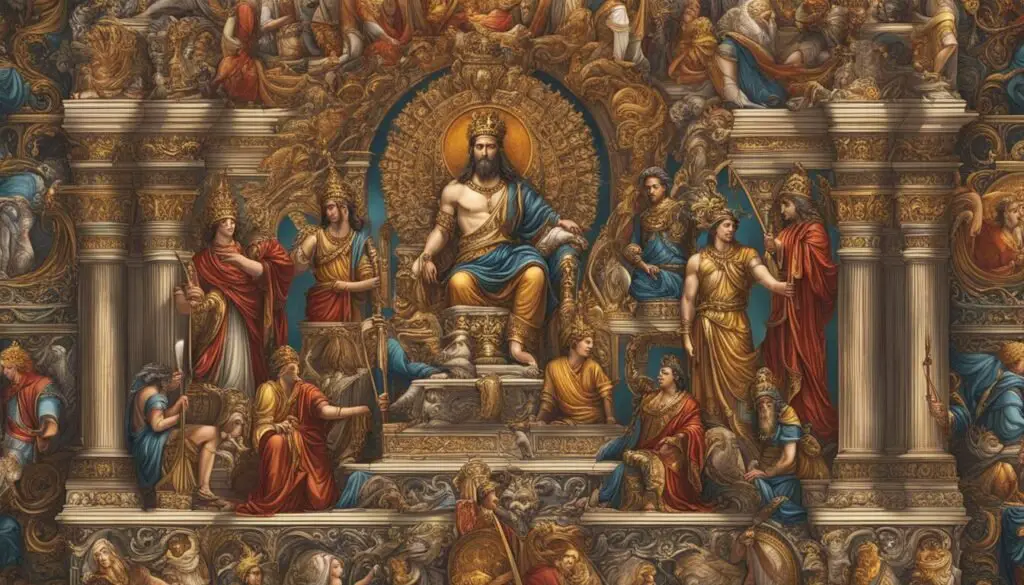
Other Major Roman Gods
While the 12 major gods of Roman mythology held significant importance in ancient Roman society, there were also numerous other gods and goddesses that were worshipped and revered. These lesser-known deities played important roles in Roman mythology and added depth to the rich tapestry of Roman religious beliefs.
One such god was Pluto, the ruler of the underworld. He was responsible for guiding the souls of the deceased to the afterlife and was often depicted as a grim and mysterious figure. Pluto’s realm held a prominent place in Roman mythology, showcasing the Roman belief in the afterlife and the importance of honoring the dead.
Another notable god was Cupid, the son of Venus, who symbolized love and desire. Cupid was portrayed as a mischievous cherub who could influence the hearts of both mortals and gods. His arrows were believed to ignite feelings of passion and attraction, making him a beloved figure in Roman mythology.
Hercules was another revered figure in Roman mythology. As a demi-god known for his incredible strength and courage, Hercules was often depicted battling fierce monsters and completing heroic feats. He embodied the Roman values of bravery and perseverance, inspiring admiration and worship from the ancient Romans.
These are just a few examples of the many gods and goddesses worshipped in the Roman pantheon. Each deity had their own unique attributes and stories, contributing to the colorful and intricate tapestry of Roman mythology and religious beliefs.
The image above represents the diversity and complexity of the Roman pantheon, with various gods and goddesses depicted. It serves as a visual reminder of the vastness of Roman mythology and the reverence with which these deities were held in ancient Roman society.
Roman Gods vs Greek God Names
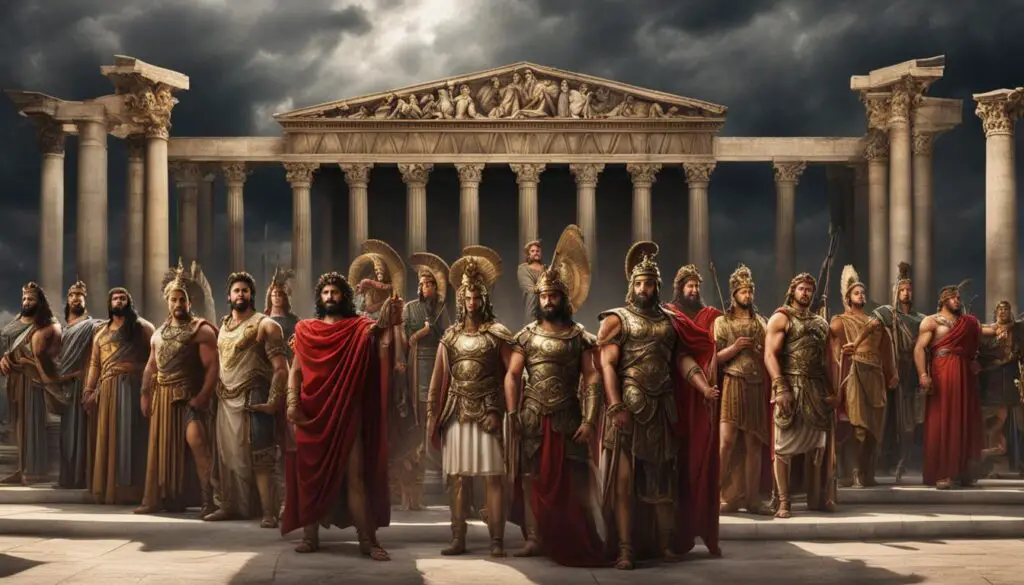
The gods of ancient Rome and Greece were both integral to their respective societies and mythologies. While there are similarities between the Roman and Greek gods, the Romans gave them their own distinct names and incorporated them into their cultural and religious beliefs.
In Roman mythology, Jupiter was the equivalent of Zeus in Greek mythology, the king of the gods and the god of thunder and lightning. Mars, the Roman god of war, shared similarities with Ares, the Greek god of war. Venus, the Roman goddess of love and beauty, corresponded to Aphrodite in Greek mythology.
The Romans adopted many aspects of Greek mythology, including the stories and attributes of their gods. However, they also added their own unique elements, creating a rich and complex pantheon in Roman mythology. This blending of Roman and Greek gods reflected the cultural exchange and influence between the two civilizations.
Key Greek and Roman God Equivalents:
- Jupiter (Roman) = Zeus (Greek)
- Mars (Roman) = Ares (Greek)
- Venus (Roman) = Aphrodite (Greek)
The Roman gods were worshipped and revered in Roman society, with temples dedicated to their worship. They played significant roles in religious ceremonies, public life, and personal beliefs. Today, their stories and symbols continue to captivate and inspire people, highlighting the enduring power and influence of Roman mythology.
The Importance of Roman Gods in Society
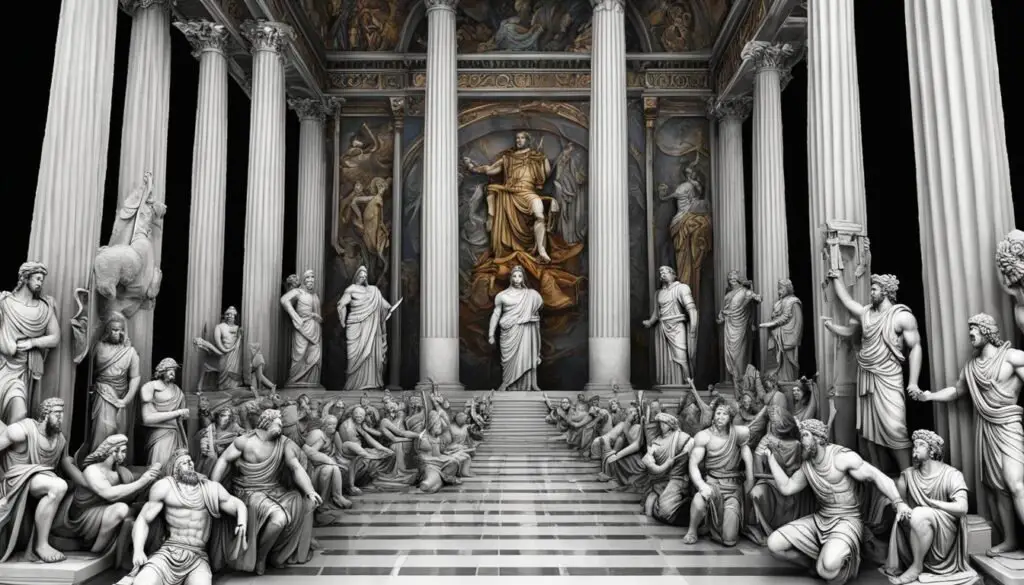
The ancient Romans held strong religious beliefs and considered their gods to be integral to their daily lives. They believed that fostering a positive relationship with the Roman gods through prayer and worship would bring them prosperity, success, and protection.
To honor and worship the gods, the Romans built shrines in their homes and temples throughout the empire. These sanctuaries served as spaces for devotees to offer prayers and perform religious rituals, seeking the favor and blessings of the gods. The Roman calendar itself was structured around religious observances, emphasizing the significance of the gods in Roman society.
The Romans deeply revered and respected their deities, viewing them as influential forces that had dominion over various aspects of life. The gods were associated with natural phenomena, such as Jupiter’s control over thunder and lightning, and they embodied human emotions and virtues.
By placing their faith in the Roman gods, the ancient Romans sought divine guidance and protection in their endeavors. The gods were believed to play an active role in their lives, and by maintaining a harmonious relationship with these deities, individuals hoped to secure their well-being and achievements.
The Role of Religion in Roman Society
Religion played a central role in Roman society, shaping its structure, traditions, and cultural practices. The belief in the gods was deeply ingrained in the fabric of everyday life, influencing social, political, and religious affairs.
Religious festivals, dedicated to specific deities, were grand spectacles that brought the community together. These events showcased the Romans’ devotion to their gods and allowed for communal celebrations and feasts.
Beyond personal spirituality, religious devotion in Roman society extended to civic and state-sponsored rituals. These rituals were performed by priests and priestesses, who acted as intermediaries between the people and the gods, ensuring the gods’ favor and protection over the city and its inhabitants.
The Roman gods not only provided spiritual guidance but also served as a moral compass for the community. Their stories and myths conveyed important lessons about virtues such as courage, wisdom, and justice, shaping the ethical values of Roman society.
The reverence and belief in the Roman gods were so deeply ingrained that their influence extended even to the judicial system. Legal proceedings in ancient Rome often included religious rituals and invocations to the gods, illustrating the pervasive role of religion in the daily lives and governance of the people.
Overall, the importance of the Roman gods in Roman society cannot be overstated. These religious beliefs provided a framework for understanding the world, established a sense of identity and cultural unity, and played a significant role in shaping moral and social values. The gods were seen as guardians, guiding and protecting the Roman people, and their worship was an essential part of the daily lives of individuals and the broader community.
Mythology and the Founding of Rome
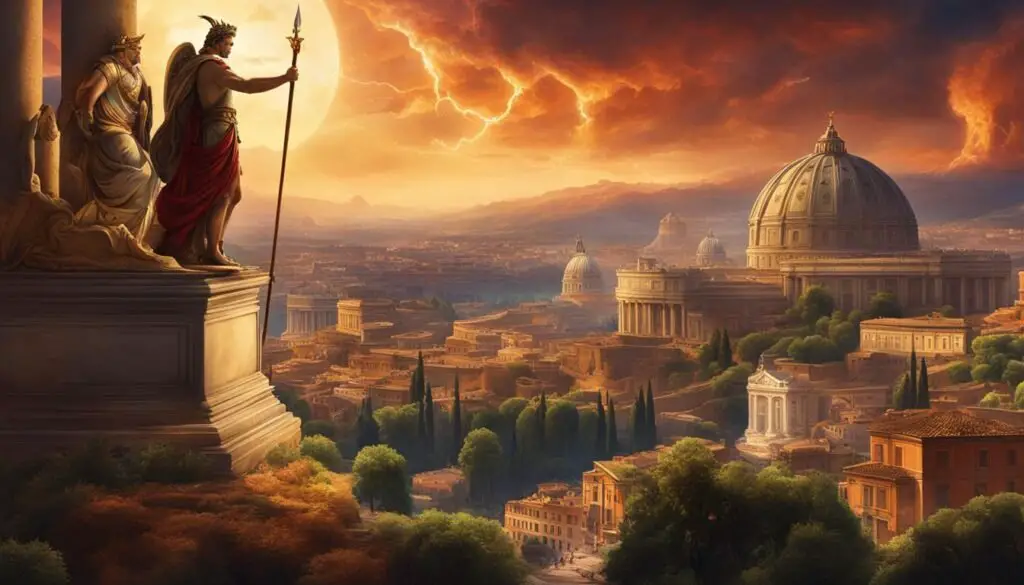
According to early Roman mythology, the city of Rome was founded by twin brothers Romulus and Remus. They were said to be the sons of the god Mars and a mortal priestess. As infants, they were abandoned and left to die, but they were saved and raised by a she-wolf. When they grew up, they decided to build a new city, but a conflict arose between them. Romulus killed Remus and became the first king of Rome. This mythical story of the founding of Rome is deeply intertwined with Roman mythology and served as a source of cultural identity for the ancient Romans.
Legend has it that Romulus and Remus chose the location for their city by following the flight of birds. They each stood on separate hills and observed vultures flying above. Remus saw six birds, while Romulus saw twelve. Believing that the gods had chosen his hill, Romulus decided to build his city on the Palatine Hill. Remus, feeling slighted, mocked the low walls that Romulus began constructing. In a fit of rage, Romulus killed his brother, asserting his dominance and securing his place as the founder of Rome.
The tale of Romulus and Remus not only explains the origins of Rome but also showcases the influence of Roman mythology on early Roman culture. It reinforced the belief that the city was destined for greatness and that the Romans were descended from gods. This myth served as a symbol of strength, resilience, and the divine origins of Roman authority.
The Legacy of Roman Mythology

Roman mythology had a profound impact on the culture and beliefs of ancient Rome. The stories of the gods and their interactions with mortals served as a way to explain natural phenomena, human emotions, and the complexities of life. These myths were an integral part of Roman society, shaping their understanding of the world and their place in it. The gods were revered and worshipped, with temples and rituals dedicated to their honor.
But Roman mythology was more than just a collection of stories. It also provided moral lessons and guidance for individuals and society as a whole. The myths taught virtues such as courage, fortitude, wisdom, and justice, guiding Romans in their daily lives. The gods themselves were often portrayed as flawed and temperamental, reflecting the imperfect nature of humanity and reminding people of the consequences of their actions.
Even after the fall of the Roman Empire, Roman mythology continued to exert its influence on Western civilization. The tales of gods and heroes permeated art, literature, and music, inspiring countless works of creativity and imagination. Renaissance artists drew upon these stories for inspiration, depicting scenes from Roman mythology in their paintings and sculptures. Poets and playwrights found inspiration in the legends, weaving them into their works of literature and drama.
The legacy of Roman mythology can also be seen in our contemporary culture. Many words and concepts from Roman mythology have made their way into the English language, such as “saturnine,” “mercurial,” and “venereal.” Additionally, references to Roman gods and stories can be found in popular culture, from films like “Gladiator” to books like Rick Riordan’s “Percy Jackson” series.
The enduring influence of Roman mythology serves as a testament to the power and significance of ancient Rome. Its gods and stories continue to captivate our imagination, reminding us of the rich cultural heritage and beliefs of the ancient Romans. Through their mythology, we gain insights into their values, fears, and aspirations, offering a window into the past and an appreciation for the complexities of human existence.
Conclusion
The ancient Roman gods, central figures in Roman mythology, were deeply ingrained in the culture and beliefs of ancient Rome. They represented the forces of nature, such as Jupiter’s control over thunder and lightning, as well as human emotions and societal values. The Romans believed that by worshipping and honoring these gods, they could ensure their well-being and success in life. This reverence for the gods was a fundamental part of their cultural beliefs and shaped their daily lives.
Today, the stories and symbols of these ancient Roman gods continue to captivate people around the world. The enduring power and influence of Roman mythology can be seen in art, literature, and even popular culture. For example, the archetype of the powerful and wise ruler can be traced back to Jupiter, the king of the gods in Roman mythology. The goddess Venus remains a symbol of love and beauty, inspiring artists and romantics alike.
Furthermore, the myths of ancient Rome provide insight into the complexities of life and lessons on morality. These stories served as a way for the Romans to explain natural phenomena and understand human behavior. They offered guidance for individuals and society as a whole. Even after the fall of the Roman Empire, the legacy of Roman mythology continued to shape Western civilization, demonstrating the lasting impact of these ancient cultural beliefs.
FAQ
Who are the 12 major gods of Roman mythology?
The 12 major gods of Roman mythology are Jupiter, Juno, Mars, Mercury, Neptune, Venus, Apollo, Diana, Minerva, Ceres, Vulcan, and Vesta.
What are the roles and attributes of these gods?
Each god had their own distinct role and attributes. For example, Jupiter was the king of the gods and controlled thunder and lightning, while Juno was the queen of the gods and goddess of women and fertility. Mars was the god of war, Venus was the goddess of love and beauty, and Apollo was the god of music and healing, among others.
How do the Roman gods compare to their Greek counterparts?
The Roman gods were often identified with their Greek counterparts, such as Jupiter with Zeus, Mars with Ares, and Venus with Aphrodite. While they shared similar stories, the Roman gods had their own names and characteristics.
Why were the Roman gods worshipped in ancient Roman society?
The Romans believed that maintaining a good relationship with the gods through prayer and worship would bring them prosperity, success, and protection. They built shrines in their homes and temples throughout the empire to honor and worship the gods.
What is the significance of Roman mythology in the founding of Rome?
According to early Roman mythology, the city of Rome was founded by twin brothers Romulus and Remus, who were said to be the sons of the god Mars. The mythical story of their founding and conflict serves as a source of cultural identity for the ancient Romans.
How did Roman mythology impact the culture and beliefs of ancient Rome?
Roman mythology provided explanations for natural phenomena, human emotions, and the complexities of life. The myths also offered moral lessons and guidance for individuals and society. Even after the fall of the Roman Empire, Roman mythology continued to influence art, literature, and music.


